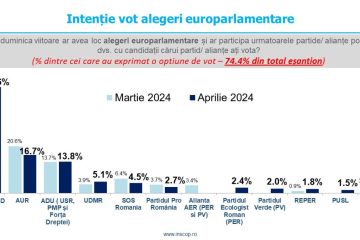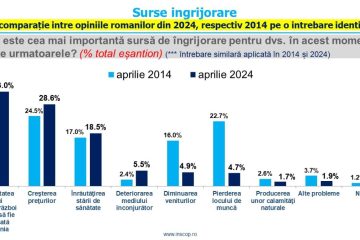![]() The European Commission today sent a strong signal to Member States to carry out structural reforms and to continue consolidating their public finances. This follows the approach that the new College of Commissioners outlined in November and is at the heart of the Annual Growth Survey 2015: a fresh focus on investment, structural reforms, and fiscal responsibility.
The European Commission today sent a strong signal to Member States to carry out structural reforms and to continue consolidating their public finances. This follows the approach that the new College of Commissioners outlined in November and is at the heart of the Annual Growth Survey 2015: a fresh focus on investment, structural reforms, and fiscal responsibility.
Here is what the College decided in detail:
Of the 16 countries identified in November as experiencing macroeconomic imbalances, the Commission stepped up the procedure for three countries: France (stage 5), Germany (stage 3) and Bulgaria (stage 5). For two countries, the Commission opened the Macroeconomic Imbalance Procedure (MIP): Portugal and Romania; for Slovenia, the Commission deescalates the procedure. The other 10 countries will see no change in their status (See Annex).
As regards fiscal efforts, the Commission recommends that no excessive deficit procedure is triggered for Belgium, Italy and Finland, even though these countries’ efforts are not in line with the debt reference value. This is because the Commission takes into account key relevant factors under Article 126(3) of the Treaty on the Functioning of the European Union.
The Commission also recommends that France be given until 2017 to correct its excessive deficit. The recommendation includes strict milestones for the fiscal adjustment path that will be assessed regularly, starting in May. This is meant to give France sufficient time to implement ambitious structural reforms.
Vice-President Valdis Dombrovskis, responsible for the Euro and Social Dialogue, said: "The package that the college discussed today constitutes the next milestone in the European Semester process after the adoption of the Annual Growth Survey last November. Obviously, our decisions take into account the global and national economic situation, as well as the intense interaction with Belgium, France and Italy in the past few weeks regarding their fiscal and structural reform plans."
Commissioner Pierre Moscovici, responsible for Economic and Financial Affairs, Taxation and Customs, said: "This is an important and balanced set of decisions which fully reflects the current economic situation. The Commission is demonstrating both the importance of structural reforms and the respect of our fiscal rules. Most of our Member States are doing the necessary efforts. Others need to accelerate and intensify their reform efforts and the reduction of their deficits and debt. We will continue to encourage them in this direction and will use all the legal tools at our disposal if necessary."
Next Steps
The Commission is making these recommendations to the Council. They are expected to be discussed at the Council of Economic and Finance (ECOFIN) Ministers meeting in March.
In March, the Commission will organise another round of bilateral meetings with the Member States to provide an opportunity to discuss the Country Reports. By mid-April, the Member States are expected to present their National Reform Programmes and their Stability or Convergence Programmes. Based on all these sources, the Commission will present a new, focussed set of Country Specific Recommendations for 2015-2016 in May, targeting the most important priorities to be tackled.
Background
The surveillance package presented today follows the adoption of the Annual Growth Survey last November and sets out the analytical basis for the adoption of Country-Specific Recommendations (CSRs) in May. It is the first time the Commission presents the economic surveillance package in this format and publishes Country Reports so early in the Semester cycle. In the past years the reports – which were then called Staff Working Documents – were presented together with the Country-Specific Recommendations in May/June. Only the in-depth reviews which are now embedded in the Country Reports were published in March. Advancing the date of publication by three months allows more time for discussions with stakeholders and more ownership by Member States.
Summary of 2015 MIP decisions of 25 February 2015
| MIP categories | 2014 | 2015* | |
| 1 | No imbalance | – | – |
| 2 | Imbalances, which require policy action and monitoring | BE, BG, DE, NL, FI, SE, UK | BE, NL, RO**, FI, SE, UK |
| 3 | Imbalances, which require decisive policy action and monitoring | HU | HU, DE |
| 4 | Imbalances, which require decisive policy action and specific monitoring | IE, ES, FR | IE, ES, SI |
| 5 |
Excessive imbalances, which require decisive policy actionand specific monitoring (for FR and HR a decision on the activation of the Excessive Imbalance Procedure will be taken in May after assessment of the NRP and SCP) |
HR, IT, SI | BG, FR, HR,IT , PT** |
| 6 | Excessive imbalances Procedure | – | – |
Notes:
* Bold signals a change with respect to 2014
** In 2014, PT was in a financial assistance programme and RO in a precautionary programme
Annex: Findings from in-depth-reviews by Member State
Belgium is experiencing macroeconomic imbalances, which require policy action and monitoring. Developments with regard to the external competitiveness of goods continue to present risks and deserve attention as a renewed deterioration would threaten macroeconomic stability. Further action to ensure convergence of cost parameters would slow down the decline of employment in the tradable sectors while tangible progress to narrow the historic cost gap could be reinforced by a tax shift towards non-labour tax bases. Public debt remains high but several factors temper associated macroeconomic risks.
Bulgaria is experiencing excessive macroeconomic imbalances, which require decisive policy action and specific monitoring. In particular, the financial sector turbulence in 2014 has raised concerns about the existence of banking practices in the domestically-owned part, with potentially significant implications for financial sector and overall macroeconomic stability. In addition, the still negative, albeit improving, external position, corporate overleveraging and weak labour market adjustment continue to pose macroeconomic risks and deserve close attention.
Germany is experiencing macroeconomic imbalances, which require decisive policy action and monitoring. Risks have increased in light of the persistence of insufficient private and public investment, which represents a drag on growth, and contributes to the very high current account surplus which continues to deserve close attention. The need for action so as to reduce the risk of adverse effects on the German economy and, given its size, of negative spillovers to the economic and monetary union, is particularly important.
Ireland is experiencing macroeconomic imbalances, which require decisive policy action and specific monitoring. Ireland completed the EU-IMF financial assistance programme in 2013 and is currently subject to post-programme surveillance and European Semester surveillance. Despite a marked improvement in the economic outlook, risks related to the high levels of private and public sector indebtedness; remaining financial sector challenges, in particular with regard to the banks’ profitability, and labour market adjustment marked by high structural unemployment, continue to deserve close attention.
Spain is experiencing macroeconomic imbalances, which require decisive policy action and specific monitoring. Spain exited the financial assistance programme for the recapitalisation of financial institutions in 2014 and is currently subject to post-programme surveillance and European Semester surveillance. Despite some improvement in the current account rebalancing, risks related to the high levels of private and public sector indebtedness and the highly negative net international investment position continue to deserve close attention in a context of very high unemployment. The need for action so as to reduce the risk of adverse effects on the Spanish economy and, given its size, of negative spillovers to the economic and monetary union, is particularly important.
France is experiencing excessive macroeconomic imbalances, which require decisive policy action and specific monitoring. The Commission will take in May, on the basis of the National Reform Programmes (NRPs) and other commitments to structural reforms announced by that date, the decision to activate the Excessive Imbalance Procedure (EIP). In a context of low growth and low inflation, coupled with a poor profitability of companies, and given the insufficient policy response so far, risks stemming from the deterioration in both cost and non-cost competitiveness and from the high and rising French indebtedness, in particular public debt have significantly increased. The need for action so as to reduce the risk of adverse effects on the French economy and, given its size, of negative spillovers to the economic and monetary union, is particularly important.
Croatia is experiencingexcessive macroeconomic imbalances, which require decisive policy action and specific monitoring. The Commission will take in May, on the basis of the National Reform Programmes (NRPs) and other commitments to structural reforms announced by that date, the decision to activate the Excessive Imbalance Procedure (EIP). In a context of subdued growth, delayed restructuring of firms and dismal performance of employment, risks related to weak competitiveness, large external liabilities and rising public debt coupled with weak public sector governance, have significantly increased.
Italy is experiencing excessive macroeconomic imbalances, which require decisive policy action and specific monitoring. In a context of protracted weak growth and persistently low productivity, risks stemming from the very high level of public debt and the weakness of both cost and non-cost competitiveness have significantly increased. The need for action so as to reduce the risk of adverse effects on the Italian economy and, given its size, of negative spillovers to the economic and monetary union, is particularly important.
Hungary is experiencing macroeconomic imbalances, which require decisive policy action and monitoring. In particular, risks stemming from the still highly negative net international position, despite some progress in the rebalancing of external accounts, the high level of public debt as well as the high regulatory burden on financial sector and a high level of non-performing loans which make the deleveraging difficult, continue to deserve attention.
The Netherlands is experiencing macroeconomic imbalances, which require policy action and monitoring. Risks stemming from the high level of private debt remain and deserve attention although recent measures support a recovery in the housing market and the curbing of mortgage growth. While the high current account surplus is partially traceable to structural features of the economy the structure of the pension and tax systems may potentially be a source of inefficient allocation of capital.
Portugal is experiencing excessive imbalances, which require decisive policy action and specific monitoring. Portugal exited the economic adjustment programme in 2014 and is currently subject to post-programme surveillance and European Semester surveillance. Despite considerable progress achieved during the programme, both as regards economic adjustment and policies, important risks remain linked to the high levels of indebtedness, both internally and externally, and across various sectors and deserve close attention. There are also strong deleveraging pressures in the context of low growth, low inflation and high unemployment.
Slovenia is experiencing macroeconomic imbalances, which require decisive policy action and specific monitoring. The rebalancing is ongoing and overall decisive policy actions, improved export performance and growth conditions have reduced risks compared to last year, in particular those linked to external sustainability. However, weak corporate governance, a high level of state ownership, a still high corporate leverage, and an increasing public debt pose risks for financial stability and growth and warrant close attention.The imbalances are therefore no longer considered as excessive but continue to deserve close attention.
Finland is experiencing macroeconomic imbalances, which require policy action and monitoring. In particular, risks related to the weak export performance in a context of industrial restructuring deserve attention. While the decline in export market shares and manufacturing industries has largely come to an end investment remains low and potential growth has declined. Private-sector debt has stabilised and does not appear to be a source of immediate concern, but its relatively high level calls for close monitoring.
Sweden is experiencing macroeconomic imbalances, which require policy action and monitoring. In particular, household debt remains at very high levels and keeps expanding as a result of increasing house prices, persistent low interest rates, still high tax incentives and housing supply constraints. Macroeconomic developments linked to private debt continue to deserve attention.
Romania is experiencing macroeconomic imbalances, which require policy action and monitoring. In the three consecutive EU-IMF programmes, external and internal imbalances have been significantly reduced. However, risks from the relatively large negative net international investment position and a weak medium-term export capacity deserve attention. Moreover financial sector stability has been preserved so far, but external and internal vulnerabilities of the banking sector remain.
The United Kingdom is experiencing macroeconomic imbalances, which require policy action and monitoring. In particular, risks related to the high level of household indebtedness, also linked to structural characteristics of the housing market, continue to deserve attention. The resilience of the economy and financial sector has increased. However, a shortage of housing will persist and is likely to underpin high house prices in the medium term and continue to leave the sector less resilient in the face of risks.
IP/15/4504




